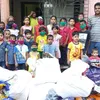Pandemic Heroes: this Delhi NGO has provided over 15 lakh meals to the needy
Rajesh Kumar, Founder of SPYM, a social enterprise, has been providing shelter to more than 5000 people, and has trained about 1,500 volunteers in critical care amidst COVID-19
The migrant population residing in Indian cities faced multiple hardships in the wake of the coronavirus pandemic. With factories and workplaces being shut after the lockdown to contain the spread of the virus, these workers had to deal with loss of job and income, and had to go hungry. Braving the summer heat, many migrant workers walked hundreds of kilometres to their hometowns without any food and water.
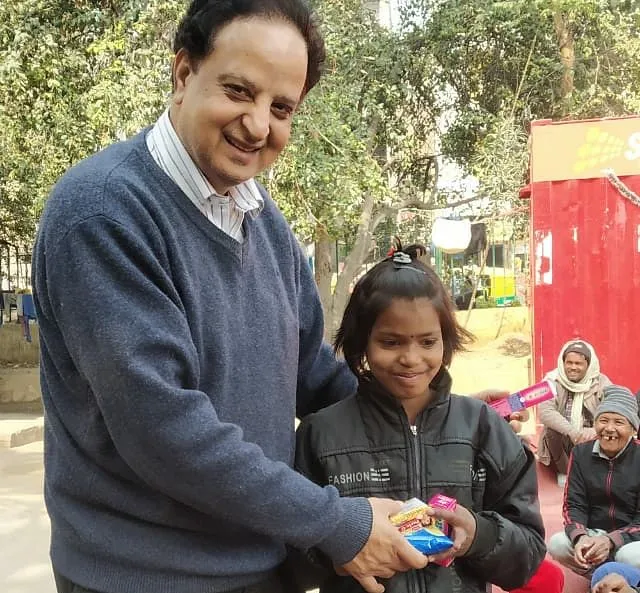
Dr Rajesh
In this scenario, over 6,000 people were stranded on the L&T campus in Sarai Kale Khan in Delhi after the lockdown. While around 3,000 people embarked on the tedious journey to their hometowns, the remaining stayed back, hoping things to turnaround.
Rajesh Kumar, 56, who has been working at the grassroots level to improve the drug situation in India, came across the plight of the migrant workers on the campus. Rajesh, who runs around 80 shelter homes across the Delhi, came forward to their rescue, and has been providing relief to these people for over a month now.
A two-time National award winner, Rajesh founded the Society for Promotion of Youth and Masses (SPYM) in 1986 to help children, adolescents, youth, and adults who are vulnerable to substance abuse. The organisation also run shelters for the homeless, and provides basic requirements like food, clothes, clean drinking water, and toilet facilities to those in need.
During the pandemic, Rajesh and SPYM have together served around 15 lakh people, and also trained more than 1,500 volunteers in basic healthcare procedures. Apart from migrant workers and daily wagers, he has also provided shelter to those in need like stranded passengers, etc.
The Society for Promotion of Youth and Masses
“I came to understand the depth of what drug dependency can do at an early age and how it can change a person’s life,” Rajesh tells Social Story.
During the course of higher studies, Rajesh realised that the laws around drug usage needed to be strengthened. So, he started a signature campaign and got nearly half a million signatures from across the country. He also met with the then Prime Minister, Rajiv Gandhi, to discuss the same.
Rajesh says, he and his friends played an instrumental role in passing the ‘The Narcotic Drugs and Psychotropic Substances Bill’ in 1985.
With the help of the Oberoi Group, they started the first drug counselling centre, and started the initial work on SPYM. The organisation works with the urban poor and homeless who are susceptible to drug usage.
“By 2000, we realised that a large number of drug users were on the streets of Delhi. We understood that one of the biggest problems was that they did not have a roof over their heads. So, with the help of the Delhi government, we started our first homeless shelter,” he says.
As of today, they run about 80 shelters, with more than 2,500 residents and help them with their basic needs.
COVID-19 relief work
Rajesh says, he realised quite early that the coronavirus pandemic will have a direct impact on the people living in shelter homes.
“We called an emergency meeting and ensured people living in shelters did not go out. We also stocked up on 30,000 kilograms of rice along with some vegetables,” he adds.
Rajesh says, the Delhi government also supported the movement, and reimbursed some of the expenses.
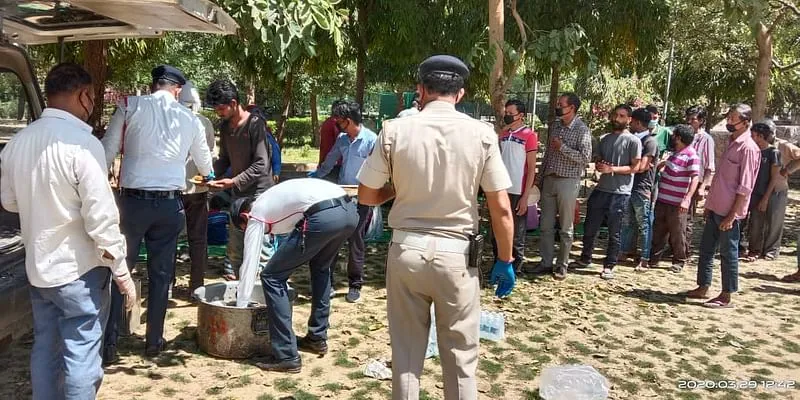
The organisation distributing food near the shelters
Further, on March 23, the team began to see the increasing gravity of the pandemic situation and started procuring resources like utensils and infrastructural support. In the days that followed, due to the temporary shutdown of eateries, the team witnessed an increasing crowd, and at one point, fed more than 15,000 people a day.
“By that time, we had about 15 kitchens, multiple vans, and over 400 people involved in this mammoth exercise,” says Rajesh. “Till now, our team has fed more than 1.5 million people, and we are still continuing,” he adds.
From March 26, migrant workers from different parts of Delhi started walking to their hometowns in Madhya Pradesh. So, the team started a camp along the Delhi-Agra route and provided these workers with footwear, electrolytes, water, and even medical aid, and continued the exercise till June 28.
“Right now, with most migrant workers having left the city, we serve about 2,000 people a day. We provide breakfast, lunch, and dinner in these shelters.”
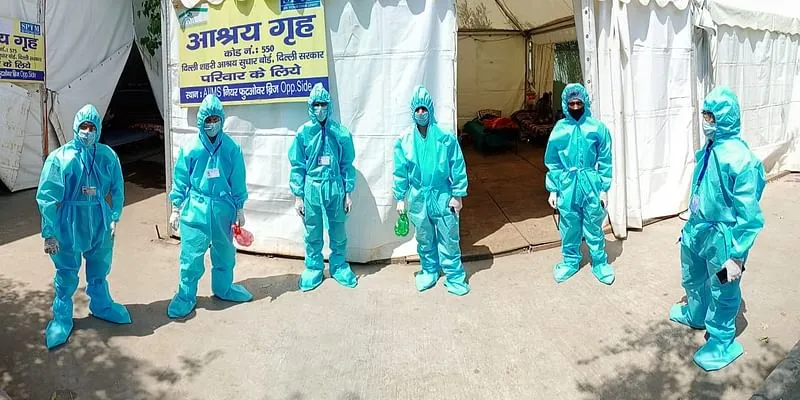
Volunteers and staff have been trained to sanitise the shelters
The team also came across people who were stranded as their flights were cancelled. Despite high-paying jobs, they had nowhere to go as there were no hotels for accommodation or ATMs nearby with money.
“We came across so many people who could not take a flight back home. Our shelters turned out to be a lifeline for them as we provided food and water,” says Rajesh.
Critical care programme
In these difficult times, with the increasing need for frontline healthcare workers, providing healthcare to the masses is difficult. However, Rajesh realised that the members of his team could be trained with the basic life-saving techniques like CPR.
With the help of Dr Amod, an expert in preventive healthcare in Delhi, team SPYM developed a programme to prepare critical-care volunteers and general volunteers to help maintain the sterile environment.
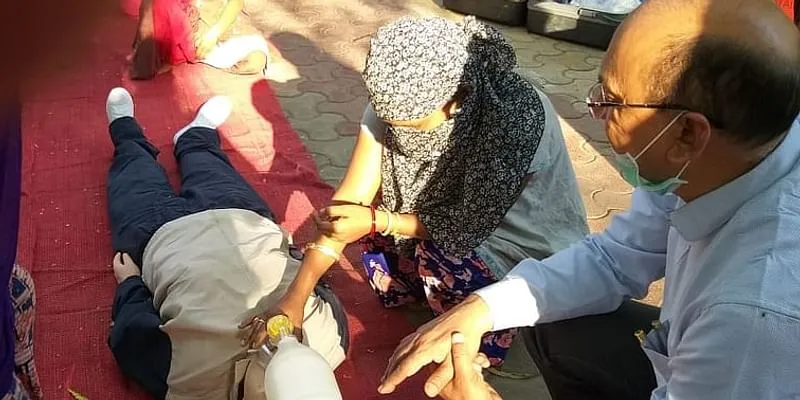
Critical care training was provided to about 1500 volunteers
“We selected about 10 residents and five staff members from each shelter and involved them in our programme. The programme involves sanitisation and sterilisation of each shelter, training on basic health and hygiene, CPR, how to use oximeters, BVM (bag valve mask) or Ambu bags, and other emergency care essentials. We have trained more than 1,500 volunteers so far,” Rajesh says.
The team also provides protective gear for the volunteers, including Personal Protective Equipment (PPE) kits, body protection suits, and sodium hypochlorite for sterilisation, to help them work efficiently in case of an emergency.
Funding and support
Rajesh says: “While the Delhi government did help us in our initiative, we got critical support from some of my friends who sent money from their personal accounts. In addition to this, the National Backward Classes Finance and Development Corporation (NBCFDC) helped us in transporting food.”
The team also received help from the National Scheduled Castes Finance and Development Corporation (NSFDC) and the GMR Airport group supported by sending packaged food to migrant workers stranded at the borders.
A bump in the road
“Working in the drug treatment centre for children, I have seen how children who completed their detox plan would eat up to 25 chapatis a day, and slowly bring down the number. It was the same situation with people going hungry due to the lockdown,” says Rajesh.
He says, one of the biggest challenges the team faced was providing unlimited meals to those who had starved for days. Another challenge was procuring food items like rice, vegetables, etc., and other essentials like masks and sanitisers during the lockdown.
Road ahead
According to Rajesh, the team will continue to provide meals to those in shelter homes until the end of August. In addition to this, they are also connecting these workers with the job market.
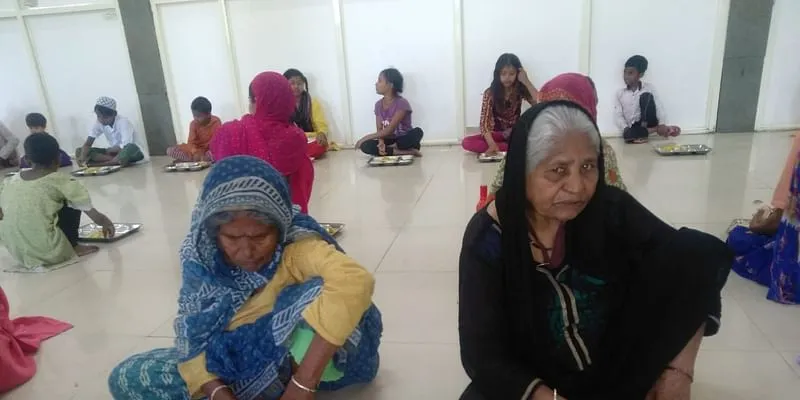
The organisation said it will continue to provide food to women and children beyond August
Recently, the Delhi government organised an event called ‘Rojgar Mela’ to connect employers with employees. Rajesh is encouraging the workers to join this mela and get a job either as a daily wager or under a contract, and get back on their feet.
“We have taught them the basics and the importance of maintaining hygiene, and now want them to get back to work,” says Rajesh. “But we will continue to support women and children,” he adds.
Edited by Megha Reddy


